Alright, so you’re thinking about starting the carnivore diet for beginners —just meat, eggs, and maybe a little cheese here and there. No carbs, no veggies, no problem! If you’re tired of the endless rules in other diets, the carnivore diet might be your new best friend. It’s all about simplicity and satisfaction (yes, you can skip the kale). This quick-start guide breaks down exactly what you need to know in 10 easy steps, so you can dive in, keep it simple, and focus on what’s really important: results.
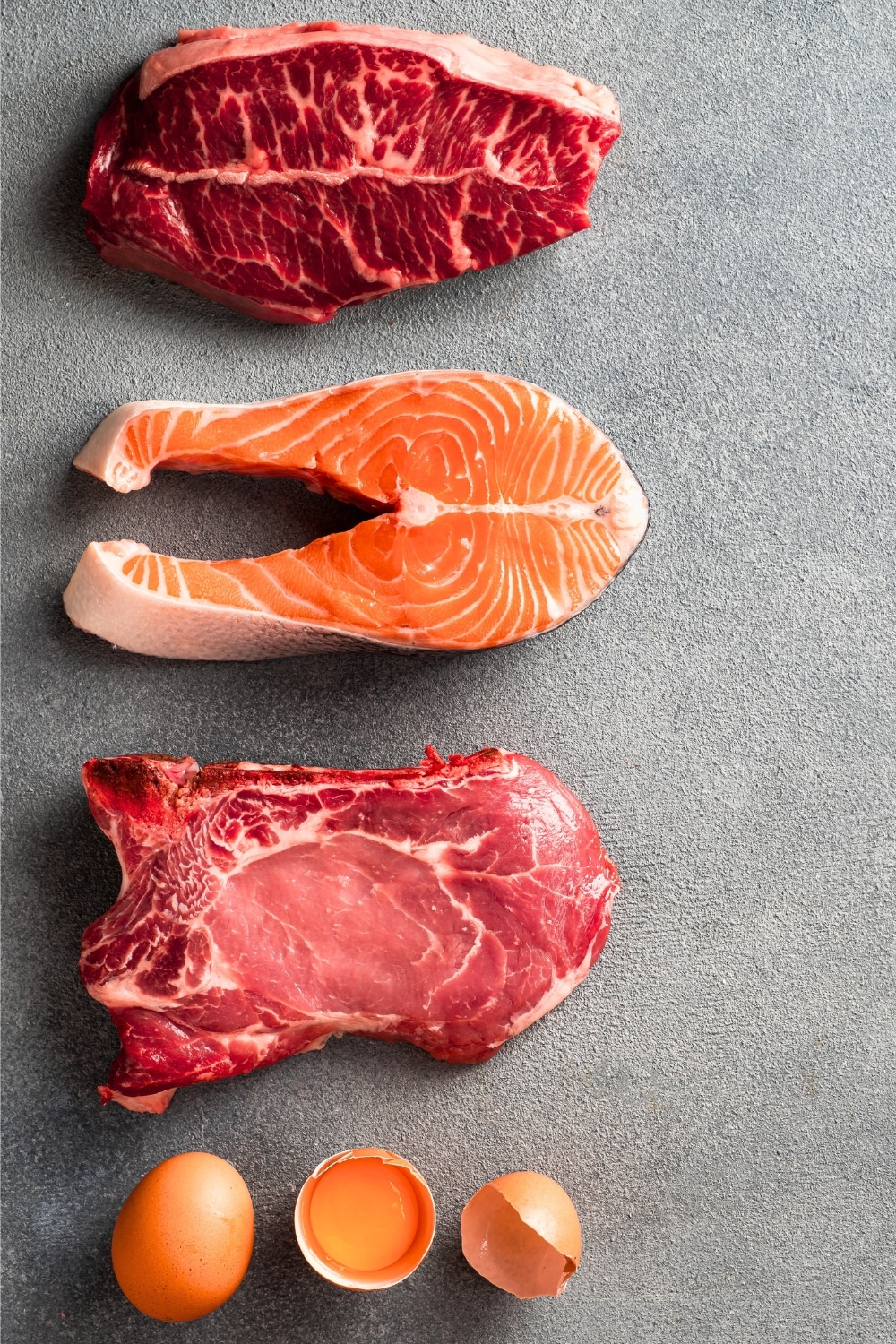
Carnivore Diet For Beginners
Whether you’re here because you want more energy, better focus, or maybe even a little weight loss, the carnivore diet is all about cutting through the noise and getting straight to what works. No need to count calories, obsess over macros, or fill your plate with things you’re just not excited about. It’s back to basics with this diet—protein, fat, and a whole lot of flavor. Think of it as the keto diet’s ultra-simple cousin, minus the carbs.
But let’s be honest—the idea of only eating animal products might feel a bit wild. It’s normal to wonder if you’ll be satisfied, if it’s healthy, or if you’ll miss that daily salad. The beauty of the carnivore diet is that it’s straightforward and satisfying. People who try it often rave about feeling full, energized, and more focused, with fewer cravings for sugar and junk. Even the hunger voices go away (you know what I’m talking about)! By keeping it simple, this approach can help reset your eating habits without a ton of effort or second-guessing.
In this beginner’s guide, I will break down exactly how to start the carnivore diet in 10 easy steps, so you can skip the overwhelm and get straight to results. Each step is designed to be practical and no-nonsense, so even if you’re totally new to this, you’ll feel confident and ready to go by the end. Let’s get you started on the path to better health, one steak at a time!
How To Start The Carnivore Diet – The Easy Way
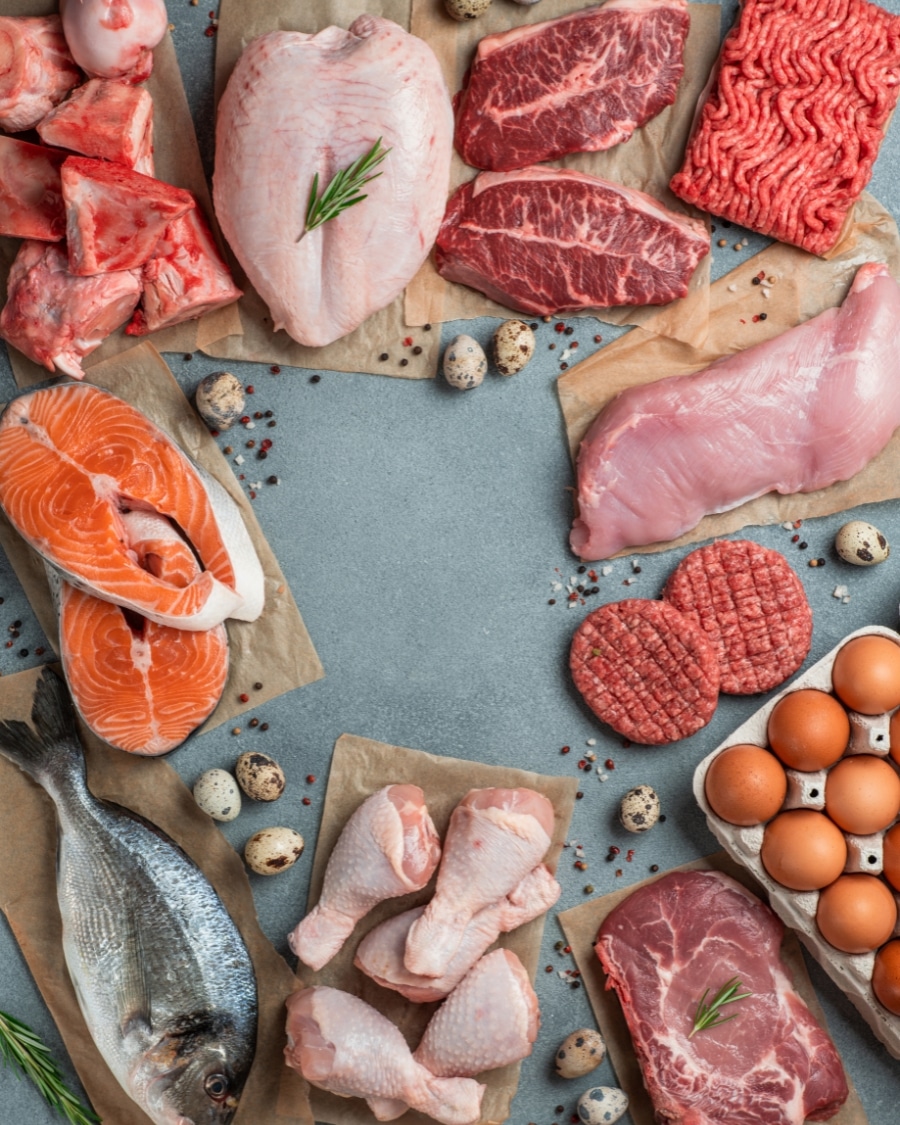
1. Understand the Basics of the Carnivore Diet
The carnivore diet is a high-protein, animal-based diet that includes only animal foods like meat, eggs, and some dairy products. This restrictive diet focuses on animal protein and excludes plant foods completely. It’s similar to the paleo diet but even more limited, focusing on whole animal foods as the primary source of fuel. Simple and straightforward: if it came from an animal, it’s fair game.
Carnivore Diet Sample Food List
- Meat – Beef (ribeye, ground beef, brisket), lamb, pork (pork chops, bacon), veal, game meats (venison, bison)
- Poultry – Chicken (whole chicken, thighs, wings), turkey, duck
- Fish & Seafood – Salmon, sardines, mackerel, shrimp, crab, lobster
- Organ Meats – Liver, heart, kidneys, tongue (nutrient-dense additions)
- Eggs – Whole eggs, including egg yolks, from chickens, ducks, or quail
- Animal Fats – Beef tallow, lard, duck fat, ghee, butter (if tolerated)
- Bone Broth – Beef or chicken bone broth for added nutrients and hydration, also helps with keto flu.
- Dairy (optional) – Heavy cream, hard cheeses, cream cheese (for a relaxed approach)
2. Clear Out Non-Carnivore Foods from Your Kitchen

Start fresh by removing all non-carnivore items—this includes grains, sugars, and vegetable oils that you’d typically find in processed foods. By sticking to high-quality animal-based foods, you’re setting yourself up for success. Less strict carnivore dieters will include spices, coffee, and honey in their diet.
3. Choose Your Animal-Based Protein Sources Wisely
Go for nutrient-dense, high-fat meats like grass-finished beef, lamb, and organ meats such as liver, which are packed with essential nutrients often lacking in plant-based diets. These foods not only support overall health but can provide key nutrients like vitamin C (yes, even red meat has some!).
Have you tried Carnivore Bar yet? Zero carb. High Fat. Just Meat. The Carnivore Bar is a meal replacement bar with just three ingredients: beef, tallow, and salt. Get 10% off today!
4. Focus on Healthy Fats for Fuel
This diet relies heavily on healthy fats from sources like beef tallow, butter, and fatty cuts of meat. Incorporating enough animal fat helps keep your energy levels stable and supports fat loss, without the usual carb crashes you might experience on a high-carb diet.
Want to save this?
Receive the latest recipes!
5. Limit Meals to 2-3 Daily
Sticking to 2-3 structured meals a day is the best way to manage hunger and support digestive health on a carnivore diet. This approach can help reduce health problems associated with frequent snacking, like weight gain and chronic inflammation.
6. Keep Beverages Simple and Sugar-Free

Stick to water, black coffee, and unsweetened tea—sugar-laden drinks can spike blood sugar and disrupt your carnivore diet plan. Hydration is key, so aim for quality over variety here. More strict carnivore dieters drink only water.
7. Prepare for the Initial Adaptation Phase
When shifting to a low-carb, high-protein diet, you might experience carb withdrawal symptoms known as “keto flu.” This phase can include fatigue, irritability, and digestive issues, as your body adapts to using fat for fuel instead of carbs. Increase salt intake to help ease symptoms.
8. Skip the Calorie Counting
The carnivore diet is all about tuning into natural hunger cues without tracking every bite. This can lead to significant changes in your relationship with food and may help reduce health risks associated with excessive calorie intake, like cardiovascular disease and chronic disease.
9. Experiment with Cooking Methods
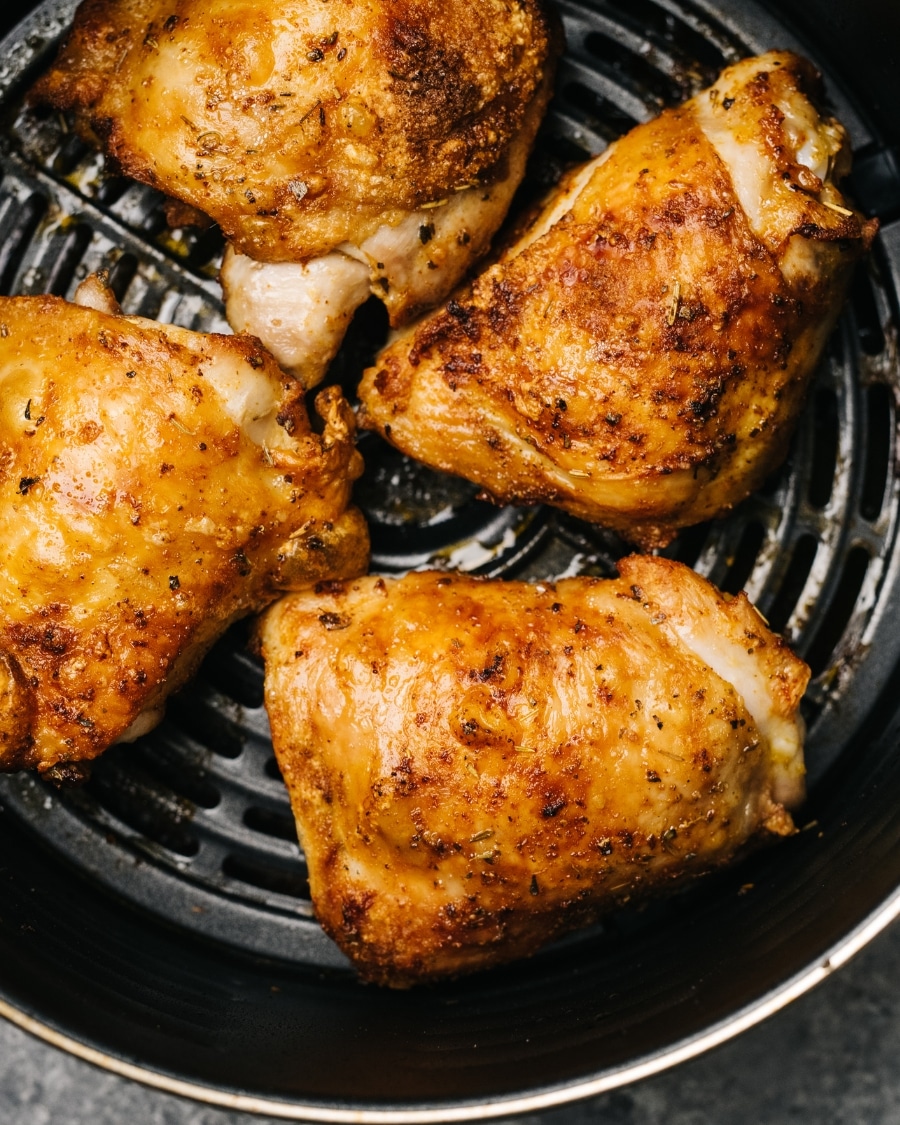
Grilling, baking, and air frying are great ways to keep meals interesting without the need for added ingredients. Trying different techniques also helps you enjoy a variety of textures in your animal-based meals, making the diet easier to stick to long-term.
10. Commit to 30 Days for Optimal Health Benefits
Give yourself a full month to see the potential benefits. Many people report improved mental health, higher energy levels, and reduced cravings for processed foods. Sticking with it can give you a better sense of how this diet affects your overall health and if it’s the right option for you in the long run.
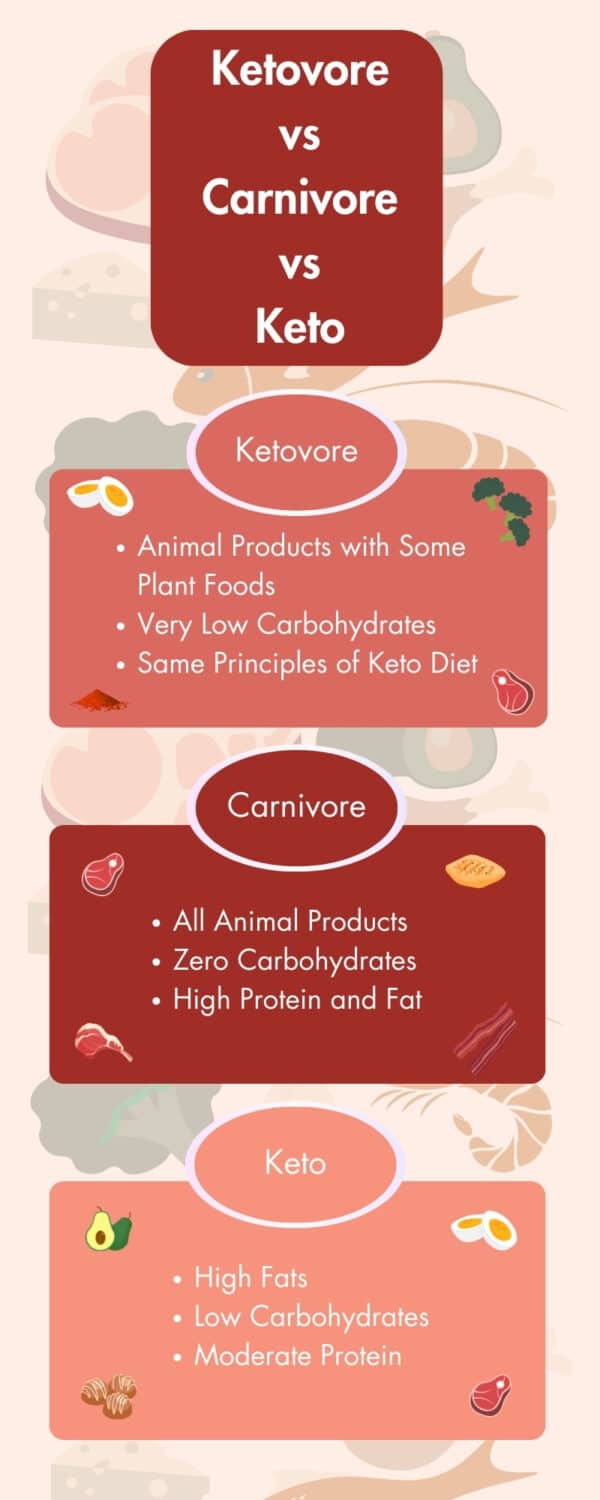
Frequently Asked Questions About The Carnivore Diet
- Can I have coffee or tea on the carnivore diet? Technically, both coffee and tea come from plants, which strict carnivores avoid. However, many people on a relaxed carnivore approach do allow coffee and tea because they’re low in carbs and calories, and often enjoyed without added sugar. If you’re looking to be strict, consider switching to hot bone broth for a warm drink alternative.
- What about spices? Spices also come from plants, so strict carnivores tend to avoid them. However, on a relaxed carnivore diet, small amounts of simple seasonings like salt, pepper, and herbs are generally accepted to keep meals flavorful without adding carbs. For strict followers, just salt is preferred.
- Can I include honey on the carnivore diet? Honey is often debated because, although it’s produced by bees, it’s technically not an animal product like meat. Most strict carnivores avoid honey due to its high sugar content, while some relaxed followers include it in small amounts for taste. If you’re aiming to stay in ketosis or for fat loss, it’s best to skip it.
- Can I use sweeteners on the carnivore diet? Most sweeteners, including those that are low carb or keto-friendly, are plant-based (e.g., stevia, monk fruit, erythritol) and are typically avoided on a strict carnivore diet. Strict followers aim to avoid all non-animal products to keep the diet as pure as possible. However, on a relaxed carnivore approach, some people may choose to include small amounts of low-carb sweeteners, especially if they’re transitioning from a keto diet or still craving sweetness. Just remember that sweeteners, even low-carb ones, may affect your hunger and cravings, and for some people, they can stall fat loss or disrupt digestive health. The goal is to stop sugar and sweet cravings. Here are some sweetener-free carnivore “dessert” ideas to ease you into it.
- Is sparkling water allowed on the carnivore diet? Some sparkling waters contain “natural flavors,” which can come from plants, making them controversial for strict carnivores. Plain sparkling water without flavors is generally accepted across all variations, while strict carnivores may choose to avoid it altogether. Check labels to ensure it’s just carbonated water.
- What’s the difference between the carnivore diet, keto, and ketovore?
—Carnivore Diet: Focuses entirely on animal foods with no plant-based foods. Strict carnivore followers eat only meat, eggs, and animal fats, while relaxed carnivores may include small amounts of spices, dairy, or coffee.
—Keto Diet: A high-fat, low-carb diet that allows both animal and plant foods but limits carbs to stay in ketosis. Veggies, nuts, and dairy are common in keto, making it less restrictive than carnivore.
—Ketovore: A mix between keto and carnivore. It’s primarily meat-focused but includes low-carb, plant-based foods in small amounts (like leafy greens or avocado). It’s a flexible option for those who want to limit carbs but still include a few plant foods.
—Strict Carnivore vs. Relaxed Carnivore: Strict carnivore includes only meat, animal fats, and salt, while relaxed carnivore is more lenient, allowing some dairy, coffee, seasonings, and occasionally honey or spices. - Is dairy allowed on the carnivore diet? Dairy is often included on a relaxed carnivore approach, especially high-fat options like butter, ghee, heavy cream, and certain cheeses. For strict carnivores, however, dairy is generally avoided to keep the diet more aligned with meat-only principles. Remember, some people find dairy can lead to digestive issues or stall fat loss, so adjust based on your personal preference and goals.
- Do I need to eat organ meats? Organ meats, like liver, are nutrient-dense and offer a wide range of vitamins and minerals that support overall health. Many experts suggest including organ meats if possible to prevent nutrient deficiencies over time. However, they’re not required, especially for beginners. If organ meats aren’t for you, focus on a variety of high-quality animal products, like grass-fed meats.
- Is this diet safe for people with health conditions like high blood pressure or kidney disease? The carnivore diet can offer health benefits like reduced inflammation and better blood sugar management, which might support certain conditions. However, it’s always best to consult a healthcare provider before making major dietary changes, especially if you have chronic disease or health concerns like kidney disease or high blood pressure.
- Can the carnivore diet lead to nutrient deficiencies? The carnivore diet provides high-quality animal protein and essential fats but lacks certain plant-based nutrients, such as fiber and specific vitamins. Organ meats can help cover potential gaps, while a relaxed approach might include small amounts of dairy or egg yolks for additional nutrients.
- What are the mental health benefits of the carnivore diet? Many people report improvements in mental clarity, focus, and energy levels after switching to a carnivore diet, often due to stable blood sugar and reduced inflammation. However, this is largely anecdotal evidence, and results may vary. Give it a try to see how it impacts your mental well-being.
- Is the carnivore diet a good option for long-term health? The long-term effects of a strict carnivore diet are still being studied. While many people report benefits, it’s essential to listen to your body and periodically assess your health. Some people choose to follow the diet for a few months, then transition to a more balanced eating style like ketovore or keto to include a wider variety of nutrients.
💡 Want easy carnivore recipes? Check out these recipe collections:
- 50 Carnivore Breakfast Recipes Ideas You Haven’t Tried Yet
- 70 Carnivore Snack Ideas That’ll Add More Variety To Your Life
- 13 Quick & Easy Carnivore Diet Desserts Without Sweetener
- 11 Easy Carnivore Soup Recipes That Are Satisfying
- 11 Carnivore Ground Beef Recipes You’ll Want to Try Today
- 11 Carnivore Freezer Meals For Easy Meal Prep
- 11 Easy Carnivore Appetizers (Finger Food/Party Food)
- Air Fryer Crispy Carnivore Cream Cheese Bites
- Carnivore Keto Egg Loaf Recipe (Made with Cottage Cheese)
- Keto & Carnivore Brown Butter Bites
PIN FOR LATER!
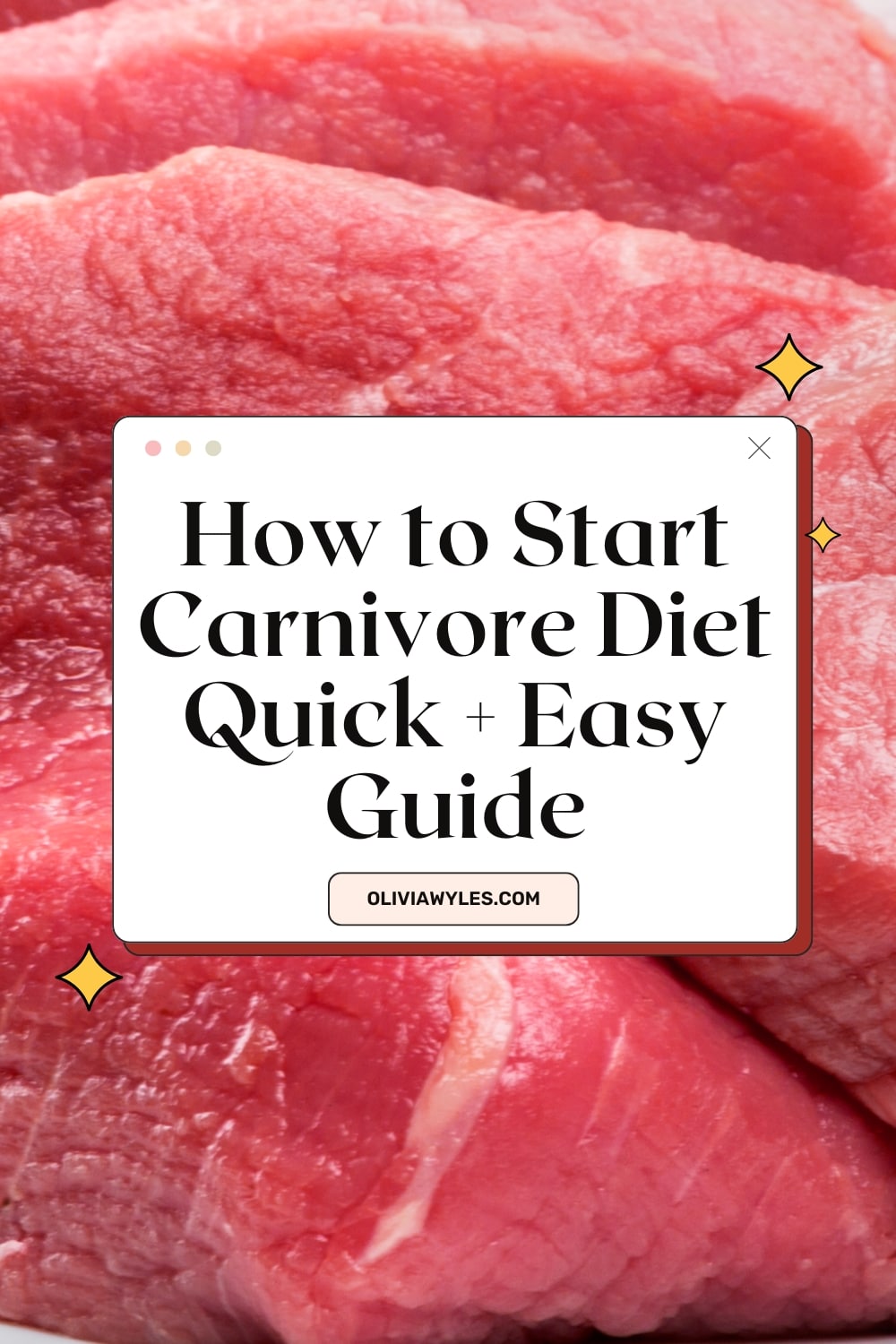




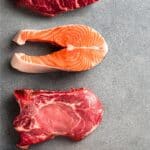

Karen
Could I consume yogurt made with half and half and yogurt cultures on a carnivore diet?
Olivia Wyles
It depends on how strict you are with your carnivore diet. Technically that would be okay for more a relaxed approach.
Susan Clifford
I’d really like to try this but I have two questions- I’m currently taking Zepbound. Can I continue taking this with the Carnivore diet? Also, thoughts on constipation? I struggle with this and use prunes, miralax, or a sennacot.
Thank you
Sue
Olivia Wyles
Hi Sue, regarding medication, you should speak to your doctor before going off of any meds or starting a new diet. The carnivore diet can potentially lead to constipation due to its lack of fiber in some people, other anecdotal evidence shows that it actually alleviates it due to the whole foods approach. More fat and less dairy can also help, and magnesium is also helpful. I am not a doctor or dietician, just a food blogger that shares her favorite easy recipes, so please consult a professional before moving forward. Thanks! Olivia
Anet Boshoff
Good morning,
I have Rheumatoid arthritis. I was diagnoses when I was 19 and I am now 48 🙂
As per norm, a bunch of medication was subscribe to me, but I am scared of using so much medication that will harm my liver and kinase.
Am I correct, if I assume that the Carnivore Diet will work 100% for me?
Olivia Wyles
Hi there, there is anecdotal evidence that the carnivore diet may be anti-inflammatory and help heal autoimmune conditions. However, I am not a doctor or dietician, nor do I claim to know everything, so as always consult with your doctor and refer to multiple sources when researching and starting a new diet.
Lisa
My PCP did this diet and he absolutely recommended this diet for me over the Mediterranean diet. I have Fatty Liver and he and another Dr who also had Type 2, fatty liver and heart issues recommended this diet as one that restored their ailments back to normal.
Olivia Wyles
So good to hear!
Windy
From my own experience with R.A, and traumatic arthritis in my left foot which was fully reconstructed…. I am on my second month and feeling pretty darn good. My foot has less days of struggle and longer walks. Inflammation is pretty much gone, unless I have a cheat day. I have lost 12 pounds which is also helping with everything, I am sure. I would have an idea of what you need for recipes. I started with 18 packs of eggs, lots of ground beef and found a you tube which showed me how to break down beef chucks into tasty steaks, short ribs and other cuts (a great way to reduce the cost and get great beef.) last but not least, a diet that does not hurt to try if you give it an honest try.